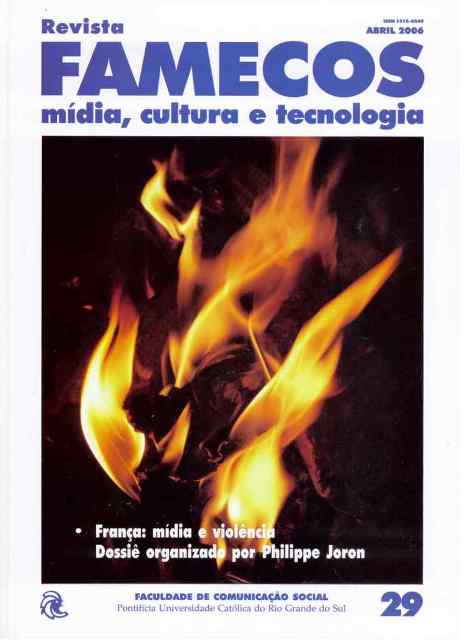O preconceito forte como um leão: repre - sentações do negro e da violência na mídia
DOI:
https://doi.org/10.15448/1980-3729.2006.29.3362Palabras clave:
Comunicação, representação, preconceitoResumen
Os preconceitos contra os negros são os mesmos em toda parte. Eles insistem, ainda hoje, na pretensa inferioridade intelectual de indivíduos supostamente violentos e de grande apetite sexual. Nossa análise enfoca exemplos norteamericanos na medida em que os Estados Unidos continuam a ser a grande fábrica de imagens midiáticas globalizadas.Descargas
Citas
BAUDRILLARD, Jean. Amérique. Paris: Grasset, Coll. Le Livre de Poche, 1986.
BINET, Stéphanie. 50 Cent, premier degré. Libération, jun. 2003.
BLANCHARD, Pascal; BANCEL, Nicolas, et al. La fracture coloniale: La société française au prisme de l’héritage colonial. Paris: Editions La Découverte, 2005.
BLUMENFELD, Samuel. On nous montre comme des vilains et non comme des héros. Entrevista com Chase Brandon, du Bureau des Relations Publiques de la CIA. Le Monde, 23 jul. 2002.
BOURDIEU, Pierre; WACQUANT, Loïc. La Nouvelle vulgate planétaire. Le Monde Diplomatique, Mai 2000.
CATHUS, Olivier. L’Âme-sueur. Le Funk et les musiques populaires. Paris: Desclée de Brouwer, 1998.
COATES, Ta-Nehisi. Keepin’ It Unreal. Selling the Myth of Bla¢k Male Violen¢e, Long Past Its Expiration Date. Village Voice, juin 2003.
CORRELL, Joshua; WITTENBRINK, Bernd et al. The Police Officer’s Dilemma: Using Ethnicity to Disambiguate Potentially Threatening Individuals. Journal of Personality and Social Psychology, v. 83, n. 6, 2002.
DA MATTA, Roberto. Carnavals, bandits et héros. Paris: Seuil, 1983.
DUCLOS, Denis. Le Complexe du loupgarou. La fascination de la violence dans la société américaine. Paris: Ed. La Découverte, 1994.
DUNCAN, B.L. Differential social perception and attribution of intergroup violence: Testing the lower limits of stereotyping of blacks. Journal of Personality and Social Psychology, 1976.
DURAND, Gilbert. Les Structures anthropologiques de l’imaginaire. Paris: Dunod, 1969.
ELIADE, Mircea. Méphistophélès et l’’Androgyne. Paris: Gallimard, 1962.
FREDRICKSON, George M. Still separate and unequal. In: The New York Review of Books, v. 52, n. 18, nov. 2005.
GOFFMAN, Erving. Stigmates. Les usages sociaux des handicaps. Paris: Ed. de Minuit, 1977.
HALL, Alice. The World in the Screen: The Impact of Character Representativeness, Society Variability, and Presentation on Audiences’ Conceptualization of Cross-cultural Media Images. TBS (Transnational Broadcasting Studies), n. 6, Spring/Summer, 2001.
KATZ, Elihu; LAZARSFELD, Paul. Personal Influence. New York: The Free Press, 1957.
KANG, Jerry. Trojan Horses of Race. Harvard Law Review, n. 118, fev. 2005.
KITWANA, Bakari. The Cotton Club. Village Voice, 2005.
LELAND, John. Hip: The History. New York: HarperCollins Publishers, 2004.
MAFFESOLI, Michel. L’Ombre de Dionysos. Paris: Méridiens, 1985.
MERTON, Robert King. Eléments de théorie et de méthode sociologique. Paris: Plon, 1965.
MORIN, Edgar. L’Esprit du temps. Paris: Grasset, 1962.
RUX, Carl Hancock. Eminem: the new white negro. In: TATE, Greg. Everything but the burden. New York: Random Books, 2003.
SLIM, Iceberg. Pimp. Paris: Editions de l’Olivier, Collection Soul Fiction, 1998.
TATE, Greg (org.). Everything but the burden. New York: Random Books, 2003.
TOSCHES, Nick. Héros oubliés du Rock’n’roll. Les années sauvages du rock avant Elvis. Paris: Editions Allia, 2000.
VELOSO, Caetano. Noites do Norte, CD, Universal, 2000.
Descargas
Publicado
Cómo citar
Número
Sección
Licencia
Derechos de Autor
La sumisión de originales para la Revista Famecos implica la transferencia, por los autores, de los derechos de publicación. El copyright de los artículos de esta revista es el autor, junto con los derechos de la revista a la primera publicación. Los autores sólo podrán utilizar los mismos resultados en otras publicaciones indicando claramente a Revista Famecos como el medio de la publicación original.
Creative Commons License
Excepto donde especificado de modo diferente, se aplican a la materia publicada en este periódico los términos de una licencia Creative Commons Atribución 4.0 Internacional, que permite el uso irrestricto, la distribución y la reproducción en cualquier medio siempre y cuando la publicación original sea correctamente citada.






